北师大版高中英语选修7Unit 20 lesson 1 Futurology 阅读课教案
- 格式:doc
- 大小:48.00 KB
- 文档页数:7
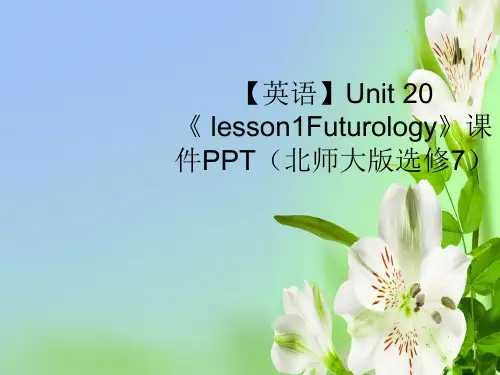
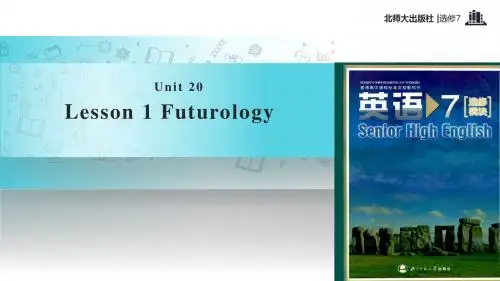
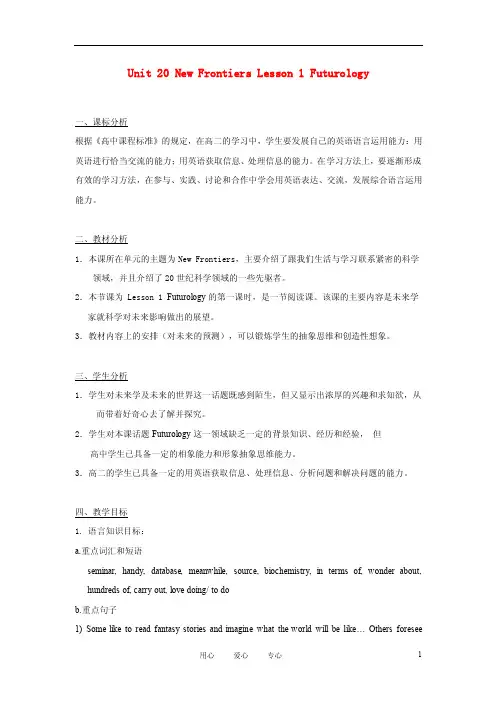
Unit 20 New Frontiers Lesson 1 Futurology一、课标分析根据《高中课程标准》的规定,在高二的学习中,学生要发展自己的英语语言运用能力:用英语进行恰当交流的能力;用英语获取信息、处理信息的能力。
在学习方法上,要逐渐形成有效的学习方法,在参与、实践、讨论和合作中学会用英语表达、交流,发展综合语言运用能力。
二、教材分析1.本课所在单元的主题为New Frontiers,主要介绍了跟我们生活与学习联系紧密的科学领域,并且介绍了20世纪科学领域的一些先驱者。
2.本节课为 Lesson 1 Futurology的第一课时,是一节阅读课。
该课的主要内容是未来学家就科学对未来影响做出的展望。
3.教材内容上的安排(对未来的预测),可以锻炼学生的抽象思维和创造性想象。
三、学生分析1.学生对未来学及未来的世界这一话题既感到陌生,但又显示出浓厚的兴趣和求知欲,从而带着好奇心去了解并探究。
2.学生对本课话题Futurology这一领域缺乏一定的背景知识、经历和经验,但高中学生已具备一定的相象能力和形象抽象思维能力。
3.高二的学生已具备一定的用英语获取信息、处理信息、分析问题和解决问题的能力。
四、教学目标1. 语言知识目标:a.重点词汇和短语seminar, handy, database, meanwhile, source, biochemistry, in terms of, wonder about, hundreds of, carry out, love doing/ to dob.重点句子1) Some like to read fantasy stories and imagine what the world will be like… Others foreseefuture opportunities and problems.2) Computers that are millions of times smarter than us will have been developed.3) In the next few years, we will be communicating with our friends around the world…4) We will have discovered other places in our solar system suitable for living and will havediscovered ways to go further into space.2.语言技能目标:1)学生学会在阅读中有目的地猜测、思考和获取信息,并进行分析、推理和判断,从而准确理解作者的意图。
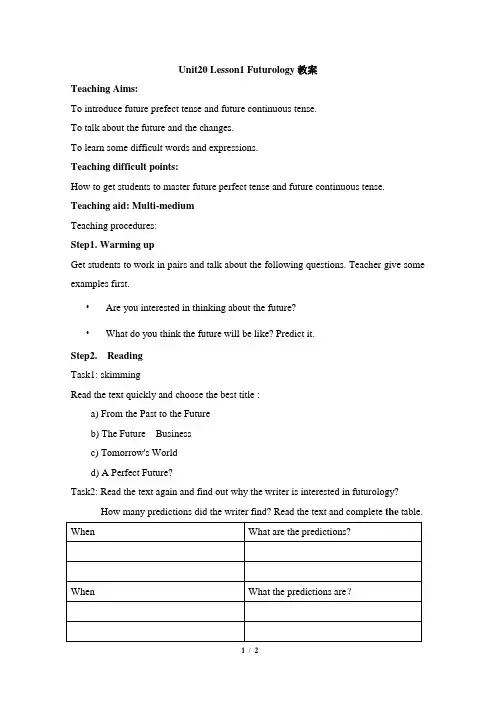
Unit20 Lesson1 Futurology教案Teaching Aims:To introduce future prefect tense and future continuous tense.To talk about the future and the changes.To learn some difficult words and expressions.Teaching difficult points:How to get students to master future perfect tense and future continuous tense. Teaching aid: Multi-mediumTeaching procedures:Step1. Warming upGet students to work in pairs and talk about the following questions. Teacher give some examples first.•Are you interested in thinking about the future?•What do you think the future will be like? Predict it.Step2. ReadingTask1: skimmingRead the text quickly and choose the best title :a) From the Past to the Futureb) The Future Businessc) Tomorrow's Worldd) A Perfect Future?Task2: Read the text again and find out why the writer is interested in futurology?How many predictions did the writer find? Read the text and complete the table. When What are the predictions?When What the predictions are?1 / 2Step3. Language pointsGet students to find out the difficult language points and sentence patterns then learn them together.Step4. GrammarAsk the students to underline the sentences with future tense, any kind of ones. Then read it aloud and analyze their usage and study the future tense.Step5. Assignment2 / 2。
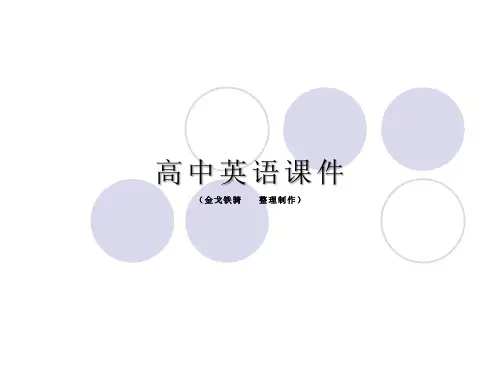
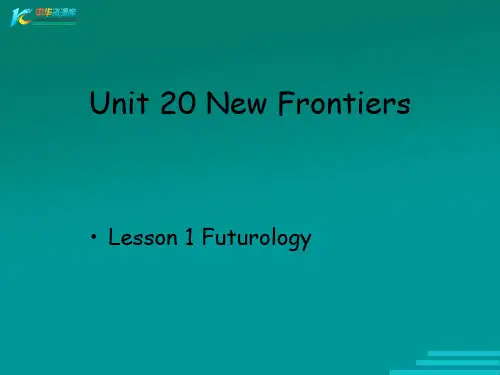
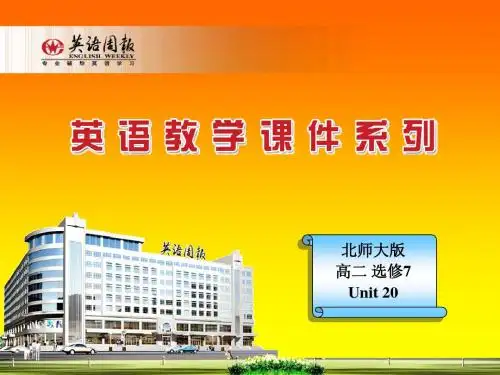
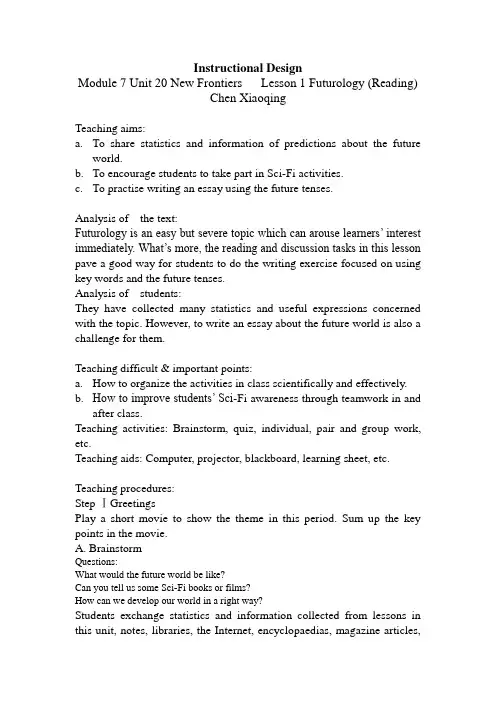
Instructional DesignModule 7 Unit 20 New Frontiers Lesson 1 Futurology (Reading)Chen XiaoqingTeaching aims:a.To share statistics and information of predictions about the futureworld.b.To encourage students to take part in Sci-Fi activities.c.To practise writing an essay using the future tenses.Analysis of the text:Futurology is an easy but severe topic which can arouse learners’ interest immediately. What’s more, the reading and discussion tasks in this lesson pave a good way for students to do the writing exercise focused on using key words and the future tenses.Analysis of students:They have collected many statistics and useful expressions concerned with the topic. However, to write an essay about the future world is also a challenge for them.Teaching difficult & important points:a.How to organize the activities in class scientifically and effectively.b.How to improve students’ Sci-Fi awareness through teamwork in andafter class.Teaching activities: Brainstorm, quiz, individual, pair and group work, etc.Teaching aids: Computer, projector, blackboard, learning sheet, etc. Teaching procedures:Step ⅠGreetingsPlay a short movie to show the theme in this period. Sum up the key points in the movie.A. BrainstormQuestions:What would the future world be like?Can you tell us some Sci-Fi books or films?How can we develop our world in a right way?Students exchange statistics and information collected from lessons in this unit, notes, libraries, the Internet, encyclopaedias, magazine articles,television and radio documentaries, friends, etc. Take notes individually and compare in pairs.B. About the word: future, biology, futurologyStep Ⅱ. Reading (Competition time)Students work in groups. Make sure every student take part in the quiz. Exercises include matching headings with each part, words and meanings and multiple choice.A. Divide the text into four parts and match headings with each part.Part.1 Paragraph A. Some predictions of the future.Part.2 Paragraph B. What is the futurologist.Part.3 Paragraph C. The writer’s plan to the meeting.Part.4 Paragraph D. The introduction about the meeting.B. About futurology and futurologistFuturology -- The study or ___________ of future _____________ ,as in science, technology, and ________ ,according to current conditions and _________ . Futurologist -- __________________________________________________________________. C. About the titleThe best title of the text ( )A. From the Past to the FutureB. The Future Business WorldC. Tomorrow’s WorldD. A Perfect FutureD. Read the text with questionsHow many predictions did the writer find?What are the predictions? When may the predictions come true?1.In the next __________________, computers will become ________ and smarter.2.By the year ___________, clothes that remain___________ will be produced.3.By the year_________, no one will die of ___________ because of enough food.4.By the year_________, it’s possible for us to live for at least ____ years.5.By the___________ of the century, a new type of ________________ might have developed.6.By the___________ of the century, other places in our solar system suitable for _____ will have been discovered.E. Extra questions1.Which of the following predictions is NOT mentioned in the passage? ( )A. ITB. clothingC. transportationD. medical care2. Where did the author find information about the seminar? ( )A. on TVB. in the newspaperC. on the radioD. on the InternetStep Ⅲ. Ⅳ. Post-reading:DiscussionHow can we develop our world in a right way?Step Ⅳ Assignment1. Write an essay about the predictions of the future individually and display them on the class micro-blog.Key Words:convenient; stainless; worn; adequate; peace; equality; assess; handy; robot; handle; danger; suitable; crowded; meanwhile; protect; rescueRequirements: 100-120 words, using “will do, will be doing and will have done”No. 430915 Deadline: April 242. Design a plan for an Sci-Fi films promotion activity, a poster included.3.Read the text again and make notes of predictions.Step Ⅴ Records on the blackboardFuturologyFuture Group 1 Group 2 Group 3Step Ⅵ Records after classWhen human beings are developing the earth, they should enhance the awareness of the importance of environmental protection. In addition, students need to collect and write more to improve their skills.。
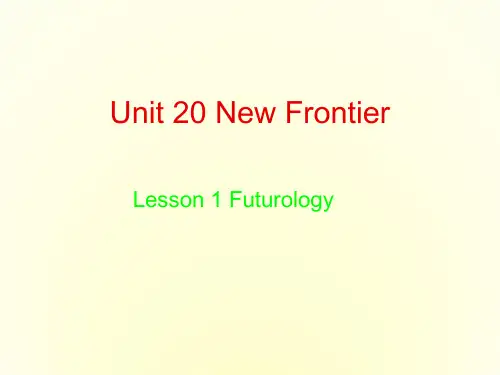
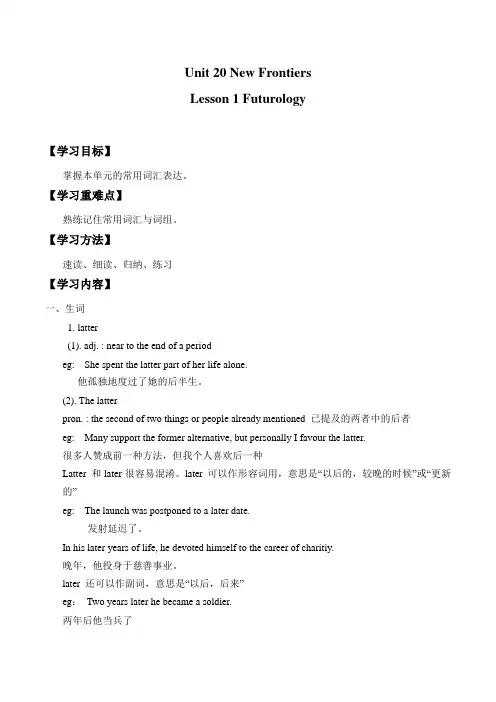
Unit 20 New FrontiersLesson 1 Futurology【学习目标】掌握本单元的常用词汇表达。
【学习重难点】熟练记住常用词汇与词组。
【学习方法】速读、细读、归纳、练习【学习内容】一、生词1. latter(1). adj. : near to the end of a periodeg: She spent the latter part of her life alone.他孤独地度过了她的后半生。
(2). The latterpron. : the second of two things or people already mentioned 已提及的两者中的后者eg: Many support the former alternative, but personally I favour the latter.很多人赞成前一种方法,但我个人喜欢后一种Latter 和later很容易混淆。
later 可以作形容词用,意思是“以后的,较晚的时候”或“更新的”eg: The launch was postponed to a later date.发射延迟了。
In his later years of life, he devoted himself to the career of charitiy.晚年,他投身于慈善事业。
later 还可以作副词,意思是“以后,后来”eg:Two years later he became a soldier.两年后他当兵了Later, his theory proved to be right.后来,结果证明他的理论是正确的。
2. assess(1). V. make a judgment about a person or situation after thinking about it carefully评价,评定It is difficult to assess the affects of the new measure.现在很难评价新举措的效果(2). V. decide or fix the value of sth. 估价,估计They assessed the value of the house at over $ 250,000.他们估计这座房子的价值超过25万美元3. dawn(1). n. time of day when light first appears 黎明,破晓We talked almost until dawn.(2). n. (fig. 比喻)beginning ,first signs of sth.People have been falling in love signs of sth.自先民伊始,人们就一直坠入爱河。
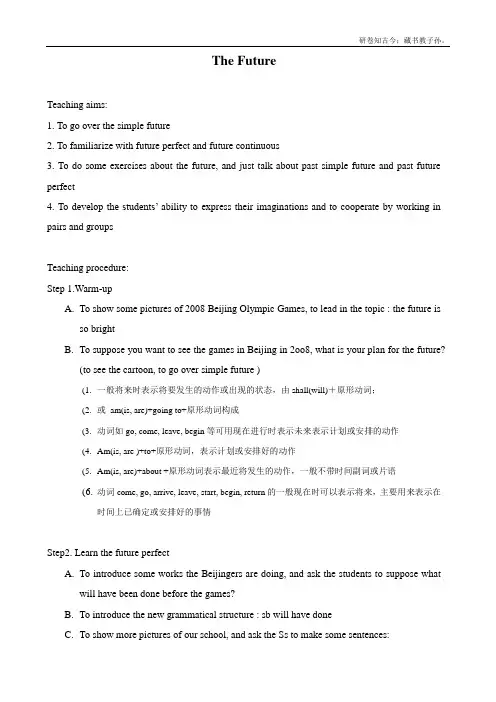
The FutureTeaching aims:1. To go over the simple future2. To familiarize with future perfect and future continuous3. To do some exercises about the future, and just talk about past simple future and past future perfect4. To develop the students’ ability to express their imaginations and to cooperate by working in pairs and groupsTeaching procedure:Step 1.Warm-upA.To show some pictures of 2008 Beijing Olympic Games, to lead in the topic : the future isso brightB.To suppose you want to see the games in Beijing in 2oo8, what is your plan for the future?(to see the cartoon, to go over simple future )(1.一般将来时表示将要发生的动作或出现的状态,由shall(will)+原形动词;(2.或am(is, are)+going to+原形动词构成(3.动词如go, come, leave, begin等可用现在进行时表示未来表示计划或安排的动作(4.Am(is, are )+to+原形动词,表示计划或安排好的动作(5.Am(is, are)+about +原形动词表示最近将发生的动作,一般不带时间副词或片语(6.动词come, go, arrive, leave, start, begin, return的一般现在时可以表示将来,主要用来表示在时间上已确定或安排好的事情Step2. Learn the future perfectA.To introduce some works the Beijingers are doing, and ask the students to suppose whatwill have been done before the games?B.To introduce the new grammatical structure : sb will have doneC.To show more pictures of our school, and ask the Ss to make some sentences:D.Practice another sentence pattern: When we have had----, we willE: time clauses (1)在when,as soon as,until, before, after时间状语从句中,通常用现在完成时代替将来完成时,主句用将来时Step3. Learn the future continuousA.Show the opening time of Beijing Games : 2008年8月8日晚上8点08分ask them what theywill be doing at that timeB.To introduce the new grammatical structure: sb will be dongC.Show the pictures of some students, ask them to make sentences:If I have, I will be -------D.To conclude the time clauses(2)E.在when,as soon as,until, before, after时间状语从句中,通常用一般现在时代替将来时,主句用将来时Step 4. The mixed use of future continuous and future perfectA Ask the students to do the exercises in the text in different groupsB Test some studentsStep5. ConclusionA.To do some multiple choices(1). I __________ for you until you _____your work.A will wait, will finishB have waited, will have finishedC will be waiting ,have finishedD have waited; have finished(2). By the year of 2052, they ________the secret of AIDS.A have discoveredB will have discoveredC will be discoveringD will discover(3). If I had a lot of time, I ___________around the world.A will travelB would travelC will have traveledD had traveled(4). If you hadn’t helped me yesterday, I ________________my work.A wouldn’t finish B. wouldn’t have finishe dC hadn’t finishedD shouldn’t have finishedB.To say something about past perfect futureC.To sum up the usage of the future时态形式用法一般将来时will/shall do, 将要发生的动作或出现的状态be going to, be(about)to将来进行时will be doing 将来某时正在进行的状态或动作,将来完成时will have done 将来某一时之前已经完成的动作过去将来时would do/was going to 从过去某一时间看来将要发生的/was(about) to 动作或存在的状态过去将来完成时would have done 与过去事实相反的虚拟语气D.To sing a song (optional )Step 6. HomeworkA English Weekly (No30)B Write a short passage to make predictions about you and your classmates in ten years’ time, using the new grammar we have learned today.(The words of the song:)"There You'll Be"When I think backOn these timesAnd the dreamsWe left behindI'll be glad 'causeI was blessed to getTo have you in my life When I look backOn these daysI'll look and see your face You were right there for me[Chorus:]In my dreamsI'll always see you soar Above the skyIn my heartThere will always be a place For you for all my lifeI'll keep a partOf you with meAnd everywhere I am There you'll beWell you showed meHow it feelsTo feel the skyWithin my reachAnd I alwaysWill remember allThe strength youGave to meYour love made meMake it throughOh, I owe so much to youYou were right there for me[Repeat chorus]'Cause I always saw in youMy light, my strengthAnd I want to thank youNow for all the waysYou were right there for meYou were right there for meFor always(2) True or false1.People who are worried about future are called futurologists.2.The experts attending the seminar will be discussing the influence of future on thetechnology.3.According to the text, computers will be more intelligent.4.By the year 2030, human-like robots may be sent around our bodies to carry out repairsand keep us healthy.5.According to the text, we may be able to live in other suitable places in our solar system atthe end of the century.(3) To check the homework( show the answer on the screen )(4) To ask the students to read aloud the words and phrasesB. To sum up the usage of simple future(1)to show a table;(2)to see a cartoon2. Learning future perfect and future continuousA Match Column A with Column BB To learn about future perfect(1)To present the sentences(2)To show up the form of future perfect(3)Drill training(4)To practice in groups: to show the pictures of our schools’ future classroom, dining room,library and laboratory and ask them what will our school have done by the end of 2007?(5)To sum up the usage of future perfectC To learn about future continuous(1)To present the sentences(2)To show up the form of future continuous(3)Drill training(4)To practice one by one: to show the pictures of some students and ask them what they will bedoing in the morning of March 14, 2016(5)To sum up the usage of future continuous3.To practice the using of future perfect and future continuousA: exercise in the textA works in groups(different groups have different tops, the Ss are asked to do the exercise orally and then some of them are checked)B: Do an interviewMake a prediction about each other in ten years’ timeC: Make a report4. Go over what we learn5. End up the lesson with a song.。
Unit 20 Warm-up and lesson 11.hundreds of好几百, 许许多多millions of times数以百万倍的thousands of成千上万的e.g. There were hundreds of people there. 那里有成百上千的人。
During the holidays, like New Year, there are usually thousands of people.在节假日,比如说新年。
在那里有成千上万的人。
看一下数字的说法,你可以用hundreds / 百, thousands / 千, 或者millions /百万来描述大数字, e.g: There were hundreds of people in Tian’anmen Square 在天安门广场有成百上千的人:There were thousands at the football match有成千上万的人观看足球比赛。
2.in terms of adv. 根据, 按照, 用...的话, 在...方面; 以…的观点;就…而说term: 学期, 期间,期限,特定的期间, 名词;术语, (pl) 合同或协议书的条件、条款、细则in the long term从长远的观点看in the short term从眼前的观点看be on good terms with a person同某人关系好scientific terms科学术语e.g The expression a+2ab+b has three terms. a+2ab+b这个式子有三项。
The academic year is divided into two terms.一学年分成两学期。
term vt 称为;把…叫做e.g. His life may be termed happy. 他的生活可称之为幸福。
3. the amount of… …数目an amount of相当数量的; 一些,许多a large amount of大量,多数4.some…others… 一些。
Unit 20 New Frontiers【教材分析】本课是一个阅读课,并且在模块7的20单元第一课,作为英语教学重要的一个课型------阅读课,在整个英语教学中占有举足轻重的地位,其中重点词汇和短语的教学是“双基”中的一个重要内容,即基本知识,同时阅读理解能力的培养也是对学生基本技能的重要要求。
所以再设计该课时,我着重从这两个方面进行教学设计,并体现为如下学习目标。
【教学目标】1. Grasp the following words and expressions:bacteria n., software n., radiation n., shuttle n., crew n., latter n., seminar n., enterprise n., garment n., welfare n., discrimination n., database n., radioactive adj., handy adj., stainless adj., electronic adj., download vt., update vt., access vt.. Wonder about/at…, look into…, die of…, carry out….2. Experience the Grammar items: the Future Perfect tense and the Future Continuous tense.教学分析:以上两条军事双基之一的“基本知识”的重要要求。
3. Improve the ability of reading comprehension.该条是双基之一的“基本技能”的一个重要体现。
【学情分析】根据多年的教学经验和目前学生的实际,学生对于时态的理解和把握以及阅读理解能力的培养将是一个难点,也是高考的重点,为此,这里把它们作为教学重难点进行重点突破,所以制定以下两个学习的重难点。
高中英语Unit 20 Lesson 1 Futurology同步练习北师大版选修7 一.用适当的介词或副词填空1.Now, listen to what Tom talks and answer the questions below.2.He looks his father.3.The scientist is never satisfied a simple answer and is always looking new questions.4.The train leaves at 6:00 p.m. So I have to be at the station 5:40 p.m. the latest.5.It’s difficult women to get good jobs in some countries.6.This toy is not suitable young children.二.短语互译1.Fantasy stories2.in terms of3.medical science4.carry out5.at least6.太阳系7.通信,通话8.数以百万倍的9.到本世纪末10. 适合...的三.用所给单词的适当形式填空1.They want to learn more about China and (China)people.2.A better (understand)of the whole world is necessary.3.I want to know your (suggest)4.After ten years hard work, they finally (success)in completing the project.5.Nobody noticed is (absent) from class.6.I like (read) poems about love.7.In the (begin), I thought he was joking.8.I feel the article was (write)for us young people.9.I don’t know how to make my(choose)10.Whenever I hear the song, my (sad)is gone.。
Unit 20 New FrontiersLesson 1 Futurology 阅读课教学设计一、课标分析根据《高中课程标准》的规定,在高二的学习中,学生要发展自己的英语语言运用能力:用英语进行恰当交流的能力;用英语获取信息、处理信息的能力。
在学习方法上,要逐渐形成有效的学习方法,在参与、实践、讨论和合作中学会用英语表达、交流,发展综合语言运用能力。
二、教材分析1.本课所在单元的主题为New Frontiers,主要介绍了跟我们生活与学习联系紧密的科学领域,并且介绍了20世纪科学领域的一些先驱者。
2.本节课为 Lesson 1 Futurology的第一课时,是一节阅读课。
该课的主要内容是未来学家就科学对未来影响做出的展望。
3.教材内容上的安排(对未来的预测),可以锻炼学生的抽象思维和创造性想象。
三、学生分析1.学生对未来学及未来的世界这一话题既感到陌生,但又显示出浓厚的兴趣和求知欲,从而带着好奇心去了解并探究。
2.学生对本课话题Futurology这一领域缺乏一定的背景知识、经历和经验,但高中学生已具备一定的相象能力和形象抽象思维能力。
3.高二的学生已具备一定的用英语获取信息、处理信息、分析问题和解决问题的能力。
四、教学目标1. 语言知识目标:a.重点词汇和短语seminar, handy, database, meanwhile, source, biochemistry, in terms of, wonder about, hundreds of, carry out, love doing/ to dob.重点句子1) Some like to read fantasy stories and imagine what the world wil l be like… Others foresee future opportunitiesand problems.2) Computers that are millions of times smarter than us will have been developed.3) In the next few years, we will be communicating with our friends around the world…4) We will have discovered other places in our solar system suitable for living and will have discovered ways togo further into space.2.语言技能目标:1)学生学会在阅读中有目的地猜测、思考和获取信息,并进行分析、推理和判断,从而准确理解作者的意图。
2)能在教师的指导下,主动参与组织和实施语言实践活动。
3.知识能力目标:1)初步了解未来学这一领域的知识及专家对未来世界的发展做出的预测。
2)通过阅读文章,学生能进一步丰富自己的知识,拓展思维。
并能就自己的知识和经历进行创造性想象。
4.情感态度目标:关注学生在学习中的情感态度,使学生在英语学习过程中,提高独立思考和判断的能力,发展与他人沟通合作的能力。
5、教学重点与难点1)如何让学生准确理解课文,获取相关信息。
2)帮助学生用英语完成语言任务。
五、教学设计理念1)运用任务型教学的模式。
给学生设计出相关的任务,要求学生用英语讨论交流,让学生学会用英语完成语言任务。
2)采用“以学生为中心”教学模式。
让学生在小组活动中进行有效的语言学习,把学生自主学习、合作学习和探究学习贯穿教学过程中,从而激发主体参与的兴趣。
六、教学策略1.教学方法a.Skimming, close-reading and scanningb.Asking-and-answering to check the Ss’ understanding of the passagec.Individual and group workd.Discussing2.教学工具A recorder, a computer and a projector七、教学过程Step Ⅰ GreetingsGreet the whole class as usual.Step Ⅱ Pre-readingT: What is the tomorrow’s world? Could you predict it.(以上述问题为导入,目的是调动学生已有的知识结构和社会生活经历,在新学知识与已有知识之间建座桥梁,为学习新知识futurology铺垫道路,引起学生兴趣,调动学生的学习动机。
)S1: It is possible that we can work at home because of communication industry.S2: Our environment will be clean, people will live longer because of the advanced medicine.S3: The speed of computer is more and more fast, so our work and life become easier and faster, foe example we can buy everything without leaving home,T: Excellent! You have a good imagination. Today we will learn lesson 1 Futurology. Let’s know some respected futurologists’ predictions of future. Before reading, let’s learn the new words and expressions on Page 110 first.(Teacher asks Students to read the words after the tape twice, then teacher gives explanations in English of some words to the students.)Step ⅢWhile-reading1. SkimmingGet the Ss to comprehend the passage quickly and meanwhile help Ss to form a good habit of reading.T: After learning words, we are going to learn lesson 1. Now please look at screen. Give you 3minutes read the passage quickly and choose an appropriate heading for it.Read the article and choose the beast heading for the passage.A. From the Past to the FutureB. The Future BusinessC. Tomorrow’s WorldD. A Perfect Future?(以找出文章标题为略读环节的问题,使学生学会按意群略读,省略大量与寻找信息关系不重要的词、短语和句子。
培养学生的快速阅读技巧和获取文章整体信息的能力。
)T: Time is up. Could you tell me which heading do you think is best, volunteer?S1: I choose A.S2: I don’t agree with him. I select C.T: Can you tell the class your reason.S2: In this passage, it doesn’t mention anything about the past, so I pass A. And Paragraph 3 to Paragraph 8, they are all about the future world. So C is the best.T: Very good, thank you!2.Close-readingIn this part, students read Paragraph 3-Paragraph 8 carefully, and then finish this table.T: Now, give you 4 minutes read Paragraph 3-Paragraph 8, and 2 minutes fill in this form.(Suggested answers are omitted.)(文章的重要段落为第3到第8段,因此在这一环节教师就重要的部段落设计了图表题,引导学生提取与主题---未来学家就科学对未来影响的展望相关的信息。
帮助学生加深对课文的理解。
)3. ScanningIn this part, Ss will read the passage carefully and then judge the statements below True or False. Then teacher shows these statements on the screen. Give Ss 5 minutes to read the whole passage.T: look at screen, please. Here are 5 detailed questions. Give you 8 minutes read the passage carefully, and then exchange your answers with your partners.Show the statements on the screen.1.People who are worried about future are called futurologists.2.The experts attending the seminar will be discussing the influence of future on the technology.3.According to the text, computers will become more intelligent.4.By the year 2030, human-like robots may be sent around our bodies to carry out repairs and keep us healthy.5.According to the text, we may be able to live in other suitable places in our solar system at the end of thecentury.(Suggested answers: F F T F T)(在精读环节教师设计了一些判断题,是将学生已学的知识和已有的生活经验相结合,对课文中的信息进行逻辑推理和分析判断,使其对课文的理解上升到一个新的高度。